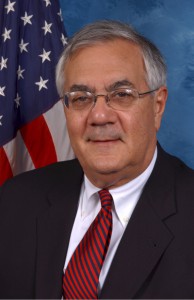Barney Frank Comes Out Again, This Time as an Atheist

Former Massachusetts Congressmember Barney Frank “comes out” as an atheist on Bill Maher’s show. But why now? Sam Mauceri talks about the secular community’s reaction to the news.
Polish up your copies of the God Delusion and start singing the Bill Nye The Science Guy theme—we’ve got another atheist to welcome aboard the secular train! It’s exciting when someone well-known comes out as humanist, atheist, agnostic, or otherwise nontheist, especially when that person is someone as influential and important as former Massachusetts Representative Barney Frank.
Barney Frank made a recent appearance on the Real Time with Bill Maher to talk about his life after Congress. When Maher joked, “You could come on this show, and sit next to a pot-smoking atheist, and it wouldn’t bother you…”, without missing a beat, Frank gestured between himself and Maher and asked, “Which pot-smoking atheist were you talking about?” The audience applauded, and Frank continued to express his regret that he could not go on to “have my husband Jim hold the Constitution, not the Bible, and affirm, not swear, that I was gonna be a wonderful Senator.”
While Frank is perhaps not the most surprising person to come out as atheist, the timing is certainly strange. After the chuckles subsided from Frank’s humorous way of disclosing his nontheism, a big question on nontheists’ minds was, “But why did it take so long?” And more specifically, “Why did Frank choose to disclose his atheism after his time in public office?”
Good questions. As it stands, Congress currently has no publicly atheist, agnostic, humanist, or otherwise identified non-theist members. That’s right: Out of 535 voting members of Congress, zero. The only out atheist in entire history of the U.S. Congress was California Representative Pete Stark, the AHA’s 2008 Humanist of the Year. While there was much speculation regarding Arizona Representative Kyrsten Sinema, who is notable for being the first openly bisexual member of Congress, Sinema has vaguely evaded any nontheistic label.
Straightforwardly, atheists need more positive representation in Congress. Atheists are still a widely hated group, especially when it comes to politics. A 2012 Gallup poll showed that most voters would sooner pick a Muslim or LGBT person for president than an atheist. Barney Frank, often referred to as a “trailblazer,” would have been an ideal candidate for the title of 2nd Out Atheist Congress Member. After all, his career survived his coming out as gay in 1987, when being gay was far less accepted than it is today. Frank, as a long-time Congressmember, had the power to influence opinions and create change, and coming out as atheist in office probably would not have hurt him in progressive Massachusetts.
Don’t get me wrong: Frank’s disclosure of his atheism is big, important news. We need more intelligent, outspoken people who are in the public eye to represent us. However, atheists can face particularly trying experiences and hardships, and coming out as anything contrary to the norm can be difficult and strange. Salon.com recognized Frank’s coming out and called it a “triumph.” But wouldn’t Barney Frank’s atheism have been so much more of a triumph for nontheists if it had happened just last year?
